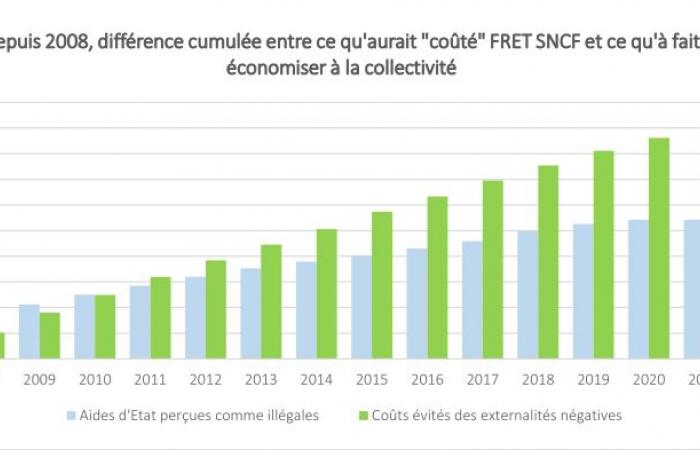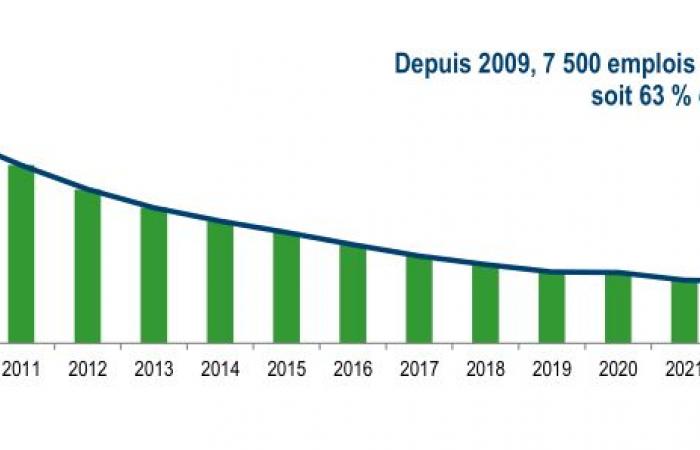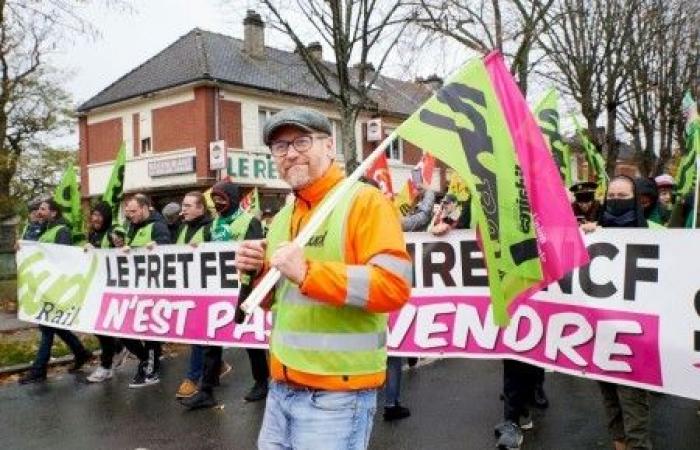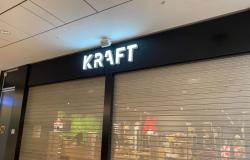The demonstration is precise and the observation is scathing. The dismantling of the goods subsidiary of the SNCFdecided by the French government, is a « disproportionate punishment », « unfair », « brutal » carried out following a « crazy calendar ». And ultimately, it won't address the problem it's supposed to solve.
Reporterre got its hands on three confidential expert reports from the Secafi firm, delivered in September 2023, March 2024 and on October 29 to representatives of the 5,000 employees of the Freight branch SNCF. Through 350 pages of figures and analysis, they offer a disconcerting dive into the ubuesque world of railway economics.
The 1is January 2025, the group's freight subsidiary SNCFwhich transported half of the goods traveling on rails, will disappear. Its most profitable activities have been sold to competing companies in recent months and 40 % of its assets (buildings, locomotives, etc.) must be sold. To replace what remains of the former public flagship, two new companies are created: Hexafret to operate the trains and Technis to ensure maintenance. They still belong to the SNCFbut will no longer be part of the group and can be privatized at 49 % in the future.
Railway unions and environmental associations demonstrated in Normandy at the end of 2023, against Fret's liquidation plan SNCF.
© Émilie Sfez / Reporterre
It was the French government which decided in September 2023 on this radical change. Officially, it is a question of cajoling the European Commission, guardian of free and undistorted competition, which accuses France of having indirectly subsidized Freight SNCFgiving it an advantage over private companies. To avoid having to repay 5.3 billion euros in undue subsidies, which would have condemned it to certain bankruptcy, Fret SNCF will therefore be scattered like a puzzle.
France is shooting itself in the foot
This « unprecedented break »driving « forced march »presents numerous risks, estimate the experts, who have access as part of their mission to the group's accounting information SNCF.
The first is economic: the twenty-three lines offered to the competition are so-called trains « complete »which connect a factory or grain silo, for example, to another factory or to a port. They are the easiest to manage. Hexafret, for its part, is asked to concentrate on trains made up of single wagons and diversified goods, « a diffuse market, complex to operate, volatile and subject to different hazards », summarize the experts. However, the bleeding imposed on the public enterprise and the « demutualization of activities » will weaken it and « cut off the company's room for maneuver ». This will result in « a more expensive economic model » and to « circulation attrition »the experts are alarmed.
This downward forecast for the number of trains in circulation risks having a perverse effect. Fewer trains means lower tolls collected by SNCF Network, the rails manager. And in fine less revenue and therefore fewer resources to maintain an aging network. It is therefore the entire world of rail freight which risks suffering, once again, from the setbacks hitting the public company.
These are the bosses of private companies competing with the SNCF who have said it in recent months, like that of DBCargo France.
The demand is back
Ironically, this bad news is piling up while demand is returning. Companies are increasingly in a hurry to demonstrate concrete ecological actions and aspire to put some of their goods on trains. But the poor state of the network leads to a lack of reliability (cancellations, delays, etc.). While « passenger traffic absorbs almost all of the network's daytime capacity », goods move mainly at night, « and suffer the nuisance of maintenance work »expected to multiply due to the obsolescence of the French rail network, notes Secafi. All these elements led to a « historic fall » of rail freight in 2023, according to the Transport Regulatory Authority (-17 % over one year).
Even more ironic, rail is actually beneficial for public finances, estimate the experts after heating up their calculator. If Freight SNCF had not been saved from bankruptcy since 2007, the postponement of its goods on the road would have caused « negative externalities » well-known (city congestion, accidents, cardiovascular diseases caused by air pollution, etc.). In total, according to Secafi, this collateral damage would have cost 10 billion euros in public spending. That is double what the rescue of the public railway company cost.
Secafi, October 2024
« France has suffered for decades from an absence of railway and industrial policy »decides the expertise. She must not lose sight, they insist, that the SNCF must be « protected from the “stupid and nasty market” in view of its environmental footprint, its national added value, its missions of general interest and public service ».
The dogma of competition, to the point of absurdity
And it's not over: « Without public support, the sustainability of the activity would be impossible. », insistent les experts. « The isolated wagon is loss-making and can only be part of a competitive logic if it is helped. » Without forgetting that the economic situation is turning gloomy, particularly in areas that use freight (automobiles, steel, etc.) and that « increasingly numerous climatic hazards disrupt train traffic, impact production, and therefore income ».
The « discontinuity plane », according to the government's words, will therefore not change the heart of the problem: the freight company's vital need for subsidies. In summary, « Fret SNCFa public company, was punished for not having been managed like a private company. And the future “private” company will be recognized in its missions of general interest through public financial support allowing the balance of its activity »mock the experts.
The plan finally provides for 10 % reduction in workforce — i.e. 500 positions eliminated — through transfers of employees to the competition and resignations. This sows anger and incomprehension, especially since railway workers have made enormous productivity efforts since 2001 and the opening of goods transport to competition from private companies.
Since 2009, 7,500 jobs have been lost, i.e. 63 % of the workforce, underline the experts.
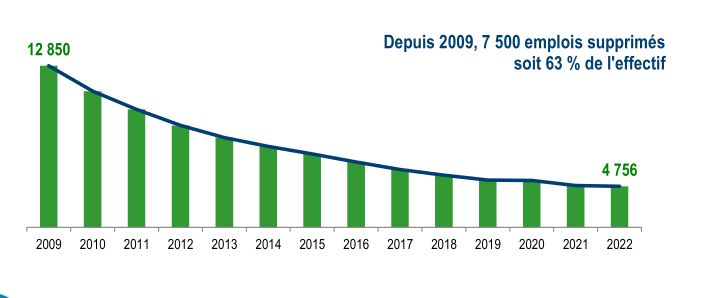
Secafi, October 2024
During a survey carried out in the form of interviews and through a questionnaire distributed to employees, the Secafi firm noted a « feeling of deep injustice » among railway workers, reinforced by « very strong attachment » agents to their work and by fifteen years of cascading reorganizations which have already worn down the troops. Nine out of ten employees surveyed consider this project incomprehensible, including among managers.
Faced with this « French paradox »experts recommend a moratorium, as proposed by a parliamentary commission of inquiry on December 13, 2023. « Loosening the schedule seems essential to us », they write, notably for « allow time for rational debate ».
« A strategy of unlimited financial profitability »
The Minister of Transport, François Durovray, ruled out this hypothesis on October 28. « Rail freight is crucial for the ecological transition, [mais] we have no choice but to go through with the Fret discontinuity process SNCF »he declared on « red lines » are according to him guaranteed, among which « no modal shift towards road » et « a solid business plan » for Hexafret.
The four representative unions of railway workers (CGTWhat, Sud, CFDT) called, with one voice, for a strike on November 21, against the « strategy of social dumping and unlimited financial profitability » of the group SNCF and its supervisory ministry. A second call for an unlimited and renewable strike has been launched, starting December 11.
legend


